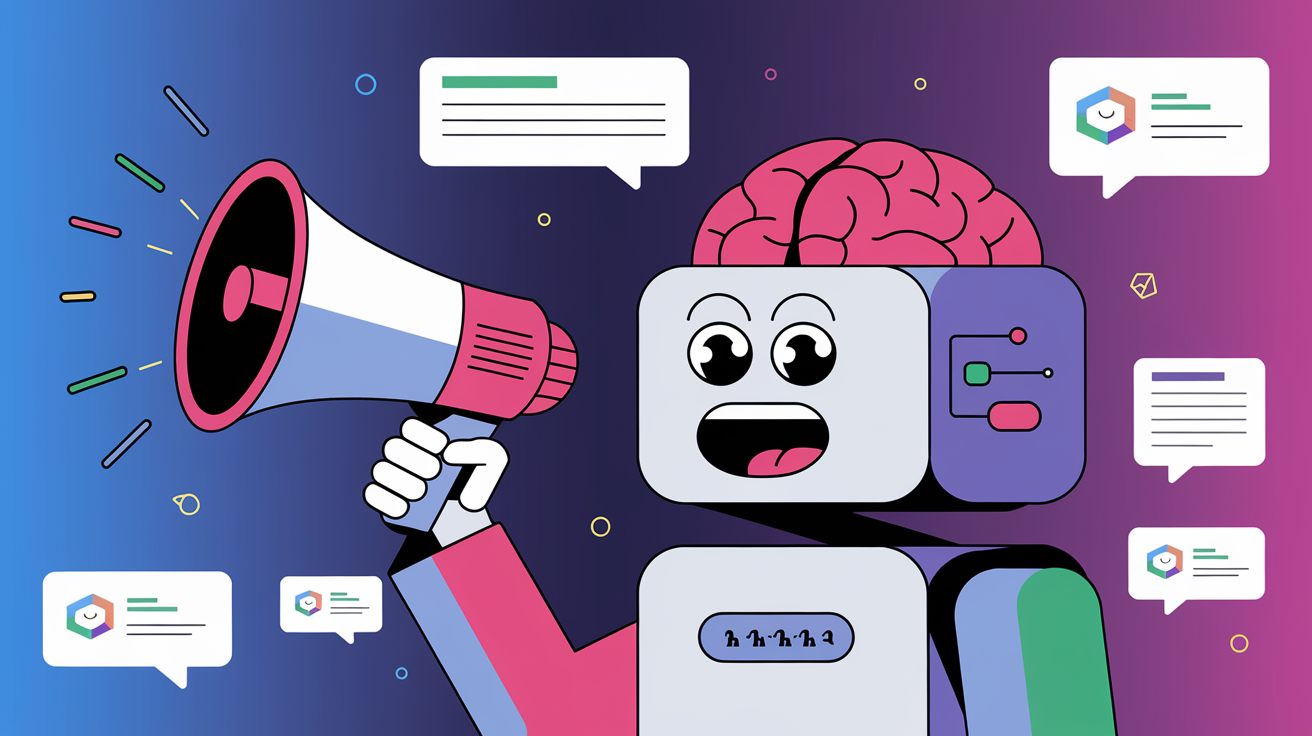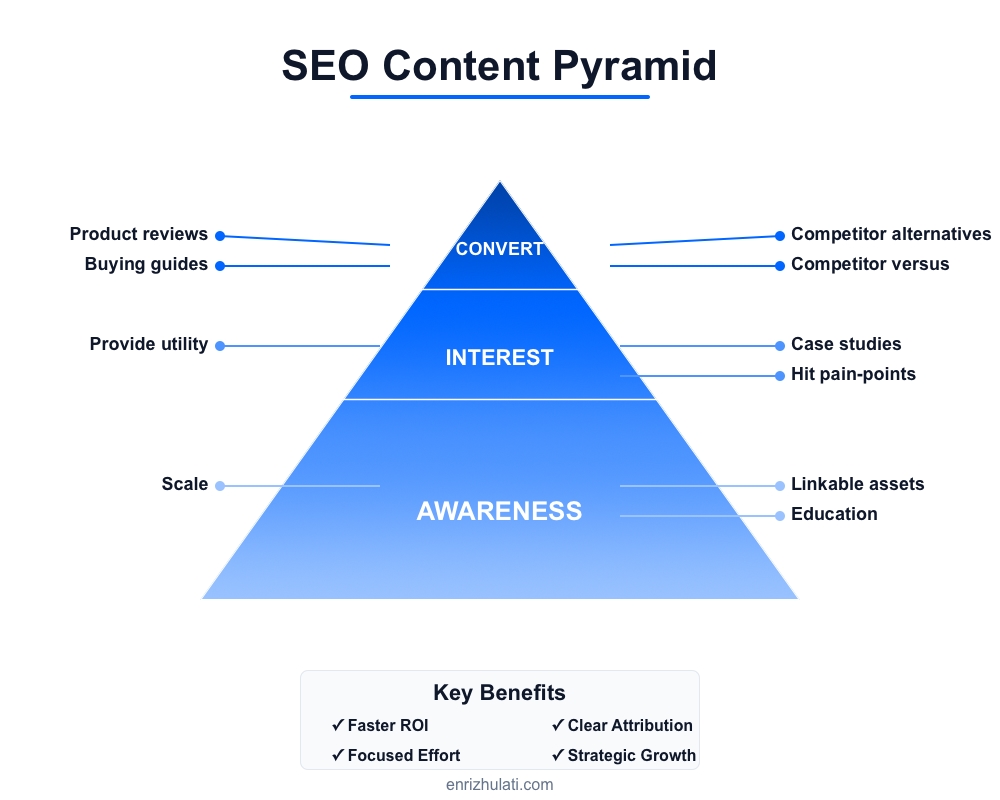Strategies to Boost Your SaaS Brand's Visibility in AI Assistants
As AI assistants become the new gatekeepers for software discovery, these 10 strategies will ensure your SaaS product appears in recommendations when users ask "What's the best tool for...?"

Why AI Assistants Are the New Gatekeepers
The battle for digital visibility has expanded beyond Google—are you prepared to win the recommendations war in AI assistants? Every day, thousands of potential buyers are asking AI assistants like ChatGPT, Claude, and Gemini questions like "What's the best project management software?" or "Recommend alternatives to HubSpot." If your brand isn't appearing in these AI-generated recommendations, you're missing a significant new channel for customer acquisition. Let's agree on something important: AI tools are becoming the new gateway to software discovery. A growing percentage of your target audience is using AI assistants to research solutions before they ever hit a traditional search engine. I promise you this isn't just another marketing channel to worry about—it's quickly becoming one of the most influential touchpoints in the buyer's journey. AI recommendations carry an implicit trust factor that's hard to replicate through other channels. In this article, you'll discover ten practical, actionable strategies to boost your SaaS product's visibility in AI assistant responses, with specific examples and implementation steps for each approach.
10 Strategies to Boost Your SaaS Visibility in AI Assistants
1. Strategic Listicle Placements
Listicle articles like "10 Best CRM Software Tools" or "Top Alternatives to Salesforce" are prime targets for AI assistants when recommending software. These roundup articles serve as trusted, pre-vetted collections that AI systems frequently cite when making recommendations according to research by Ahrefs shared in late 2024. Here's how to leverage this opportunity:
Three ways to quickly find listicle opportunities:
Reverse-engineer AI sources: Ask ChatGPT or Claude something like "What are the best email marketing tools?" and check what sources it references. These are publications you want to be mentioned in.Scan the web systematically: Use search operators like "best [your category] software" + "top 10" to find existing listicles ranking well in search results.Study competitor placements: Search for your competitors' names along with terms like "alternative" or "vs" to see what comparison articles they're featured in. Once you've identified target publications, reach out to the authors or editors with a concise pitch highlighting what makes your solution unique. Position yourself as a helpful resource rather than someone just seeking promotion. The key is to focus on providing genuinely helpful information about your product's unique value proposition, not just trying to get your name on the list. As Digital Success Blog explains, "the field of AI is constantly evolving, and staying informed through reputable sources and industry events will keep you ahead of the curve."
2. Implement Comprehensive Schema Markup
Structured data in the form of JSON-LD schema is becoming increasingly important for AI visibility. Recent evidence suggests that AI systems don't just process schema as tokenized text but can leverage it as structured data to better understand your business and offerings.
Here's how to implement schema for maximum AI visibility:
Use SoftwareApplication schema: This specific schema type helps AI systems understand that your product is software, along with its key features, pricing, and requirements.Add FAQPage schema: FAQPage structured data is particularly valuable for AI assistants seeking to answer questions about your product category. Include common questions and detailed answers about your product.Implement Organization schema: This helps AI assistants understand your brand, its founding date, location, and social profiles, building trust and recognition. The most important aspect is selecting JSON-LD as your schema format since it's "highly recommended due to its flexibility and ease of implementation," allowing you to add structured data without altering visible content. Use Google's Rich Results Test and Schema Markup Validator to verify your implementation is correct before publishing.
3. Create Authoritative Content with Deep Research Qualifiers
When users ask AI assistants about software recommendations, newer systems like Anthropic's Claude often ask qualifying questions before providing answers. For example, if someone asks about "best field sales software," the AI might ask qualifying questions about: Required featuresBudget constraintsCompany sizeIndustry specificsRole targeting Your content strategy should anticipate and address these qualifying factors. This is especially important as "LLMs act as sophisticated research assistants, seeking content that provides insights and solutions to user queries."
Create dedicated pages that specifically address different use cases, company sizes, and industry applications:
"How [Your SaaS] Serves Enterprise vs. SMB Customers""[Your Category] Solutions for the Healthcare Industry""Budget-Friendly [Your Category] Options for Startups" The more comprehensively you answer potential qualifying questions on your website, the more likely AI assistants will recommend your solution when users provide specific requirements.
4. Develop Solution and Product-Aware Content
Generic marketing content doesn't give AI assistants enough specific information to confidently recommend your product. Instead, create targeted content that showcases: Detailed feature explanations with real-world applicationsHead-to-head competitor comparisons highlighting your differentiatorsProduct walkthroughs showing how your solution solves specific problems According to Search Engine Land, AI-driven search is "moving from traditional keyword-based ranking to dynamic, AI-generated answers," making it essential to focus on building "semantic authority that LLM-based ranking systems value." Don't be afraid to create this content even if keyword research tools show low search volume. AI assistants often reference detailed content when answering specific questions, regardless of traditional SEO metrics. For example, Whatnot successfully enhanced its trust and safety features by employing AI for content moderation and fraud protection, demonstrating how combining specific, detailed product information with real-world applications improves both customer experience and likely AI visibility as reported by Evidently AI.
5. Leverage Strategic PR and Mentions
Brand mentions in respected publications significantly impact AI assistant recommendations. Recent research indicates that visibility in sources that AI systems frequently reference can substantially impact how often your brand appears in AI responses.
Focus your PR efforts on:
Industry publications known to be in AI training dataPodcast interviews where your product category is discussedGuest articles explaining industry challenges you solveCase studies featured in vertical-specific publications When pursuing these opportunities, be intentional about the language used to describe your product. Consistency in how your solution is categorized and described helps AI assistants understand exactly what problem space you occupy. One effective approach is to connect with journalists through platforms like HARO (Help A Reporter Out) or similar services, offering your expertise as a trusted Subject Matter Expert (SME). This not only builds your brand's authority but also creates valuable citations that AI systems can reference.
6. Create Comprehensive FAQ Content
Question-and-answer format aligns perfectly with how AI assistants process information. Creating robust FAQ content directly maps to the conversational nature of these systems.
Beyond basic product questions, develop FAQ content around:
Feature-specific questions: "How does your automation feature handle [specific scenario]?" Pricing clarity: "What's included in the Enterprise tier that's not in Professional?" Competitive differentiation: "How does your approach to [feature] differ from [competitor]?" Structure each answer to be self-contained and comprehensive, making it easy for AI assistants to extract complete, helpful responses. According to WebFX, optimizing for "Answer Engine Optimization (AEO)" is essential for increasing visibility on AI platforms. This involves structuring your content to appear in AI-generated responses to user queries.
7. Leverage Reddit and Community SEO
Reddit has emerged as a significant training source for AI models, making it a valuable platform for building brand visibility. However, success on Reddit requires understanding each community's unique culture and providing genuine value rather than promotional content.
To effectively leverage Reddit:
Identify relevant subreddits: Find communities where your target audience discusses problems your solution addresses.Engage authentically: Participate in discussions by offering helpful advice without immediately pushing your product.Share valuable content: When appropriate, link to genuinely helpful resources from your site that solve specific problems being discussed.Host AMAs: Consider hosting "Ask Me Anything" sessions where you can showcase your expertise and mention your solution in context.Monitor brand mentions: Track where your brand is being discussed to ensure accuracy and address any misconceptions. This approach not only improves your AI visibility but also builds genuine community relationships that can lead to word-of-mouth referrals.
8. Implement Technical Optimizations for Crawlability
For tools like ChatGPT, crawlability is essential because it determines how easily web crawlers can index your site. The more crawlable your site is, the better your chances of ranking higher on search engines, which in turn affects your visibility in AI systems that leverage search data.
Implement these technical optimizations:
Ensure clean HTML structure: Use semantic HTML elements to clearly define your content's structure.Optimize metadata: Implement clear title tags, meta descriptions, and heading hierarchies.Improve page speed: Faster-loading pages are more likely to be fully crawled and indexed.Create XML sitemaps: Submit comprehensive sitemaps to search engines to ensure all your content is discovered.Fix broken links and redirects: Maintain a clean link structure to maximize crawl efficiency. According to Search Engine Land, sites looking to improve AI visibility should focus on "clean HTML, metadata, fast responses, and bot-friendly configurations."
9. Develop Original Data and Expert Insights
AI assistants prioritize unique, authoritative information when making recommendations. Creating original research, surveys, or data analysis about your industry gives you a significant advantage.
Some effective approaches include:
Annual state of the industry reportsCustomer success metrics from your platformImplementation time studiesROI analysis across different customer segments
When presenting this data, make it easily digestible for both human readers and AI systems:
Use clear tables and charts with descriptive captionsInclude methodology information to establish credibilityAdd expert commentary explaining the implications Even on a small scale, original insights that can't be found elsewhere make your content distinctly valuable to AI assistants seeking to provide unique, helpful recommendations.
10. Implement Continuous AI Visibility Monitoring
As AI systems continue to evolve, it's essential to regularly monitor how your brand appears in recommendations and refine your strategy accordingly. Flow Agency recommends creating a dashboard to "help you check and monitor traffic to your site from LLMs" that highlights which platforms are driving the most traffic and conversions.
Implement these monitoring practices:
Regular AI recommendations testing: Periodically ask AI assistants questions related to your product category and document where and how your brand appears.Track referral traffic: Set up UTM parameters and analytics to identify traffic coming from AI platforms.Monitor competitor mentions: Track how and where competitors are being recommended to identify gaps in your strategy.Set up alerts for important keywords: Create notifications for when your brand or important industry terms are mentioned in high-authority publications.Regular schema validation: Ensure your structured data remains valid as you update your site.
Implementing Your AI Visibility Strategy
Improving your presence in AI recommendations isn't a one-time project but an ongoing strategy that should evolve as these tools develop. Start by auditing your current content against the strategies above. Identify the biggest gaps, particularly around detailed product information, competitor comparisons, and unique data or insights. Prioritize creating the content types most relevant to your specific customer journey. If you're in a crowded market, focus first on competitive differentiation and listicle placements. For newer categories, emphasize educational content that helps AI assistants understand your solution space. The most important principle is maintaining authenticity. AI systems are increasingly sophisticated at identifying promotional content versus genuinely helpful information. Focus on creating truly valuable resources that happen to feature your product, rather than thinly veiled advertisements.
Real-World Example: How a B2B SaaS Company Improved AI Visibility
Let me share a brief case study of how these strategies worked for a real company (with details modified for confidentiality). A mid-sized project management SaaS was struggling to appear in AI assistant recommendations despite having strong Google rankings.
They implemented several key strategies:
Structured data implementation: They added comprehensive SoftwareApplication and FAQPage schema markup across their site.Feature-specific content: They created detailed pages explaining how their solution addressed specific use cases across different industries.Listicle outreach: They contacted authors of popular "Best Project Management Tools" articles, offering detailed information about their unique features.Reddit engagement: Their product team began thoughtfully participating in r/projectmanagement, offering helpful advice without being promotional.
Within three months, they saw:
15% increase in direct traffic from users mentioning they discovered the tool through AI recommendationsAppearance in 7 out of 10 ChatGPT responses to relevant queries (up from 2/10)22% increase in trial signups attributed to AI assistant referrals
The Future of SaaS Discovery
As AI assistants become more integrated into the software buying process, visibility in these systems will only grow more important. The MIT Technology Review notes that "AI means the end of internet search as we've known it," with generative AI having "serious implications for online advertising and media" as it summarizes information from online sources. The companies that will benefit most are those that view AI visibility as an extension of their broader commitment to transparency, helpfulness, and genuine value creation—not as a technical SEO trick to be gamed. The landscape is rapidly evolving, with Search Engine Land reporting that "traditional SEO must adapt to meet the sophisticated needs of AI." This means staying informed about new AI systems and continuously refining your approach as these platforms evolve.
Continue Reading

The ROI of Technical SEO
Technical SEO might seem complex, but it delivers some of the highest ROI of any digital marketing strategy—often with results that compound over time.

5 Web Design Mistakes That Are Costing You Customers
Stop losing potential customers due to poor web design—learn the five most damaging website mistakes and how to fix them for better conversion rates.

Your Framework for Driving Traffic and Growth That Pays
The SEO Content Pyramid framework prioritizes conversion-focused content first, helping businesses generate leads faster while building sustainable organic traffic.
